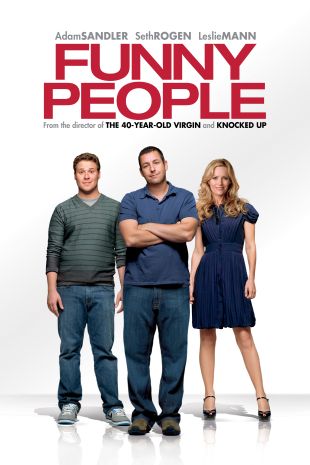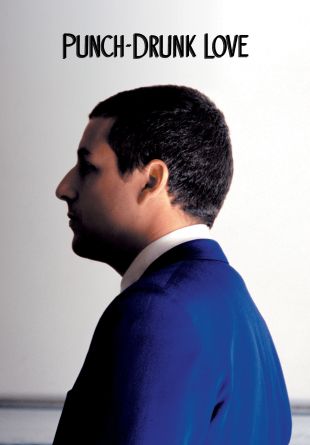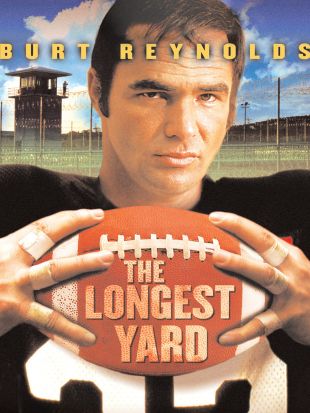One of the most endearing goofballs to ever grace the stages of Saturday Night Live, affectionately offensive funnyman Adam Sandler has often been cited as the writer/performer who almost single-handedly rescued the long-running late-night television staple when the chips were down and it appeared to have run its course. Though his polarizing antics have divided audiences and critics who often dismiss him as lowbrow and obnoxious, Sandler's films, as well as the films of his Happy Madison production company, have performed consistently well at the box office despite harsh and frequent critical lashings.
Born in Brooklyn on September 9th, 1966, it may come as no surprise that Sandler was a shameless class clown who left his classmates in stitches and his teachers with a handful. Never considering to utilize his gift of humor to pursue a career, Sandler eventually realized his potential when at the age of 17 his brother encouraged him to take the stage at an amateur comedy competition. A natural at making the audience laugh, the aspiring comedian nurtured his talents while attending New York University and studying for a Fine Arts Degree. With early appearances on The Cosby Show and the MTV game show Remote Control providing the increasingly busy Sandler with a loyal following, an early feature role coincided with his "discovery" by SNL cast member Dennis Miller at an L.A. comedy club. As the unfortunately named Shecky Moskowitz, his role as a struggling comedian in Going Overboard (1989) served as an interesting parallel to his actual career trajectory but did little to display his true comic talents.
It wasn't until SNL producers took Miller's praise to heart and hired the fledgling comic as writer on the program that Sandler's talents were truly set to shine. Frequent appearances as Opera Man and Canteen Boy soon elevated him to player status, and it wasn't long before Sandler was the toast of the SNL cast in the mid-'90s. While appearing in SNL and sharpening his feature skills in such efforts as Shakes the Clown (1991) and Coneheads (1993), Sandler signed a recording contract with Warner Bros., and the release of the Grammy-nominated They're All Gonna Laugh at You proved the most appropriate title imaginable as his career began to soar. Striking an odd balance between tasteless vulgarity and innocent charm, the album found Sandler gaining footing as an artist independent of the SNL universe and fueled his desire -- as numerous cast members had before him -- to strike out on his own. Though those who had attempted a departure for feature fame in the past had met with decidedly mixed results, Sandler's loyal and devoted fan base proved strong supporters of such early solo feature efforts as Billy Madison (1996) and, especially, Happy Gilmore (1996).
His mixture of grandma-loving sweetness and pure, unfiltered comedic rage continued with his role as a slow-witted backwoods mama's boy turned football superstar in The Waterboy (1998), and that same year found Sandler expanding his persona to more sensitive territory in The Wedding Singer. Perhaps his most appealing character up to that point, The Wedding Singer's combination of '80s nostalgia and a warmer, more personable persona found increasing support among those who had previously distanced themselves from his polarizing performances.
As the decade rolled on, Sandler also appeared in the action-oriented Bulletproof (1996) and the even more affectionate Big Daddy (1999). In 2002, Sandler starred in a re-imagining of Mr. Deeds Goes to Town, titled simply Mr. Deeds.
Beginning in the late nineties, Sandler's Happy Madison production company launched such efforts as Deuce Bigalow: Male Gigolo (1999), Little Nicky (2000), The Animal and Joe Dirt (both 2001). Deuce Bigalow: European Gigolo appeared in (2005), and Grandma's Boy in (2006). Despite critical castigation for scraping the bottom of the barrel with these efforts, Sandler's commercial instinct remained intact; the films all hit big at the box office and drew an ever-loyal base of fans who gravitated to any feature with Sandler's name attached.
The early 2000s also saw Sandler attempting to branch out in a number of unusual directions, which included the animated "Hanukkah Musical" 8 Crazy Nights (2002). Sandler also began dipping his toes into the realm of drama with a starring role in the eccentric, critically acclaimed tragicomedy Punch-Drunk Love (2002), directed by Paul Thomas Anderson. Sandler also starred in the Jim Brooks-helmed comedy/drama Spanglish (2004), an unsually subdued and gentle turn away from the irascible types that Sandler usually played. The critical receptions were, again uneven, as reviewers loathed 8 Crazy Nights, justifiably praised Punch-Drunk across the board, and espoused mixed feelings about Spanglish.
Perhaps well aware of the extent of these risks that he was taking with his career, Sandler continued to sustain his popularity with a steady (and reliable) stream of crowd-pleasing star vehicles throughout the early 2000s. 2002's self-produced Sandler vehicle Anger Management (which teamed him up with a maniacal Jack Nicholson); the 2004 effort 50 First Dates, in which he co-starred with fellow Wedding Singer alum Drew Barrymore; and the 2005 remake of Robert Aldrich's The Longest Yard all made box office gold.
In 2006, Sandler starred in yet another hit: Click, a surrealistic comedy directed by Frank Coraci, co-starring Sean Astin, Kate Beckinsale and Christopher Walken. The film was a big hit and, having spent the past few years playing it safe, Sandler decided it was a good time to take another chance. He signed on to star with Don Cheadle in the 2007 drama Reign Over Me, playing a man who lost his wife and children in the 9/11 attacks, and is headed for complete self-destruction. The critics weren't as enamored with this dramatic attempt as they were with Punch-Drunk Love, but Sandler was mostly well received even when the film wasn't. Always tempering his risks with more predictable career moves, the actor next signed on to appear alongside King of Queens star Kevin James in the buddy movie I Now Pronounce You Chuck and Larry, a comedy about two straight firefighters who pretend to be a gay couple to receive domestic partner benefits.
On a seemingly never-ending roll with his broadly appealing comedic roles, Sandler next played an Israeli secret agent and skilled beautician in 2008's You Don't Mess with the Zohan. He followed this up with a turn in the kids comedy Bedtime Stories in 2009, before adding a dash of dramatic acting to a humorous role once more, with the 2009 Judd Apatow flick Funny People. For Sandler's next project, he reteamed with Cuck and Larry co-star Kevin James for the 2010 romp Grown Ups, before cozying up to Jennifer Aniston for the romantic comedy Just Go With It in 2011. Despite his beautiful co-star, Just Go With It did poorly at the box office, and so for his next movie, the funnyman chose a more bankable supporting actor: himself, playing both a man and his own annoying twin sister in the 2012 comedy Jack and Jill.



